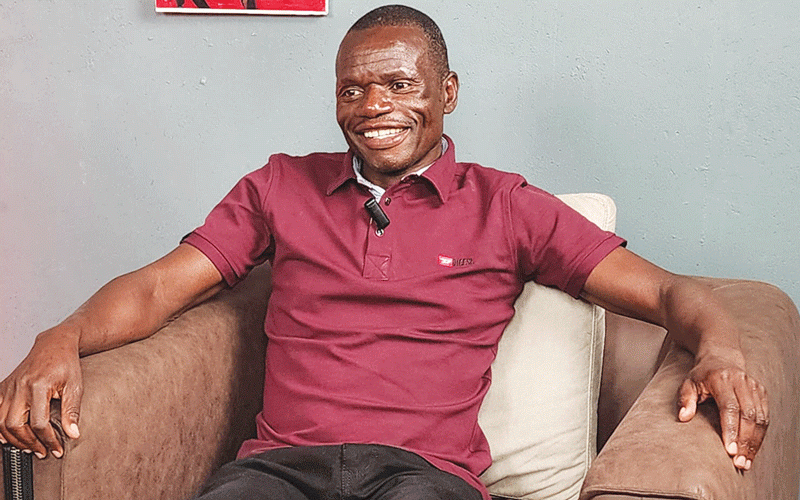
HIS name is now hidden in the shadows of the sungura music industry, yet shining brightly with talent, energy and dedication.
A voice that weaves together threads of soulful and passionate music managed to place him on a level he desired.
He never chose to pretend or fake his life, opting to compose music that speaks directly to the heart.
Such is the journey to stardom for sungura musician Liversy Matamba (54), who hails from Highfield high-density suburb in Harare.
Matamba told NewsDay Weekender that carving his name was no joke.
It was a struggle.
“My journey to being a recognised brand was never smooth as I faced many hurdles, ranging from financial shortages, dishonest band members and being rejected by recording companies,” he said.
“Originally, I had planned to be a traditional musician, but Bothwell Nyamhondera advised me to try sungura since in traditional music, there was stiff competition from Thomas Mapfumo, Oliver Mtukudzi, James Chimombe and Marshall Munhumumwe. I had to quickly turn to sungura.”
- ‘Music sector marred by dishonesty’
- Chivaviro, Makhabane drop collabo
- Village Rhapsody: Winky D’s Eureka mirrors the state of Zimbabwe
- Mbeu’s new wife tears Mhodzi Tribe apart
Keep Reading
Matamba added: “I moved from one band to another. Firstly, it was Zimbabwe Stars, then Dove and Yeukai Brothers. I would poach band members secretly from other bands, but at the end, it was heartbreaks and disappointments as I would be snubbed.
“The situation only changed after the intervention of Kenny Chitsvatsva, which saw me recording my first album Zvinoitika (1996) at RTP, which was produced by Raymond Makahamadze.”
For Matamba, as his musical career was beginning to shape up, unfortunately Lady Lucky was not on his side.
He found himself without a band. A new door opened for him and grabbed it with both hands.
“I must say I was snubbed by Doves. Luckily, I managed to get help from Yeukai Brothers and recorded three tracks on the album Vakakurera Vakuru [1998] at Gramma Records,” Matamba said.
The sungura musician then decided to try his luck in recording with a newly-opened recording company Corner Studios and was granted a contract.
After recording two albums with different bands, he thought he had mastered all the tricks, but he was horrified to note that the band members secretly planned to sabotage him and demanded payment before recording.
“When I thought I had struck the right cord to record my new album, the band members demanded payment upfront before entering the studio and on the other side, the recording company [Corner Studios] also wanted a new name for the band. That was when Chivaraidze Express [meaning entertaining] was born.
“I recorded Upenyu Hwedu [1999] which had hit tracks such Hazvina Mhosva, Mari, Makomborero, Rudo Rwangu Ruzere and Wakanganwa,” he said.
“The songs became instant hits and they were regularly played on Radio 2 [Radio Zimbabwe] Top 10 and Top 20 programmes and also on Radio 3 [Power FM) they got massive airplay, especially on Hits View.
“This opened the gates to where I am today. I have recorded 15 albums and a new offering is also ready which I might release anytime soon.”
Matamba’s music has been always anchored on society and culture as he sings music that resonates with the masses.
“My music connects with people as I take the role of a teacher. Through music, people’s lives have changed, especially for those who were getting lost culturewise,” the man behind the Hazvina Mhosva hit said.
“Today, some marriages are intact because of the message carried in music.”
To this day, he feels he has not achieved much despite being in the music industry for more than three decades.
“I have been behind the mic since 1988, but to date, I think I have not reached my full capacity. I have learnt that music is not for the faint-hearted. A person has to soldier on no matter how difficult it can be,” Matamba said.
“The biggest achievement so far was when my song Mbimbindoga from the album Kurarama Kwedu was nominated in the Nama [National Arts Merit Awards] awards, although I did not win.
“As a musician, I want to be remembered as a teacher and entertainer in the music circles.”
The sungura musician wishes to see policymakers crafting laws that protect musicians as well as artistes getting united for a cause.
“My wish is to see musicians united by helping each other wherever necessary for the good of the industry,” he said.
“Local musicians are not being accorded the same respect given to foreign artistes who come to perform in the country. I feel those artistes are being given too much respect and we sometimes do much better than them.”
He added: “Policymakers must lobby for a budget strictly meant to help and promote musicians. I wish government can build tourism village in every town or city where music will be showcased as a way of generating revenue and preserving culture.”
Despite the setbacks, Matamba has endured the test of time and continues to create, inspire and uplift a true reminder that music’s value lies beyond fame or fortune.










